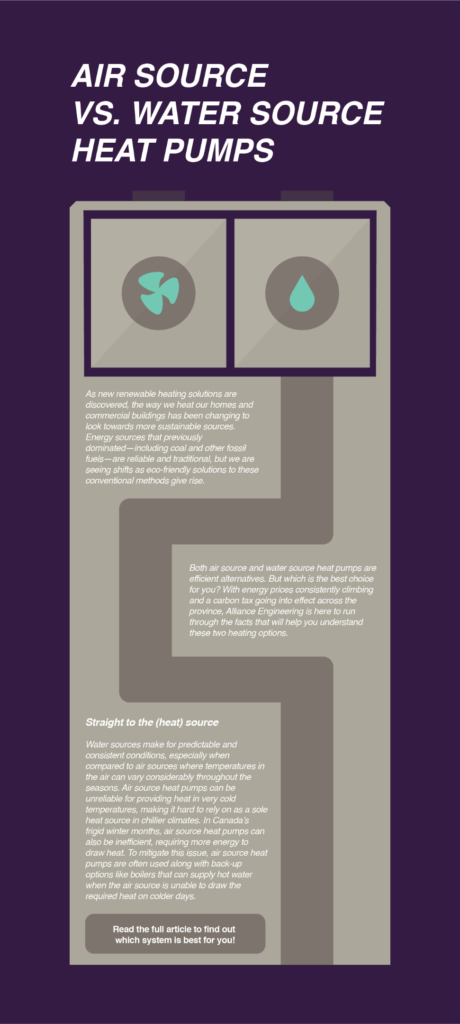
As new renewable heating solutions are discovered, the way we heat our homes and commercial buildings has been changing to look towards more sustainable sources. Energy sources that previously dominated—including coal and other fossil fuels—are reliable and traditional, but we are seeing shifts as eco-friendly solutions to these conventional methods give rise.
Both air source and water source heat pumps are efficient alternatives. But which is the best choice for you? With energy prices consistently climbing and a carbon tax going into effect across the province, Alliance Engineering is here to run through the facts that will help you understand these two heating options.
Straight to the (heat) source
Water sources make for predictable and consistent conditions, especially when compared to air sources where temperatures in the air can vary considerably throughout the seasons. Air source heat pumps can be unreliable for providing heat in very cold temperatures, making it hard to rely on as a sole heat source in chillier climates. In Canada’s frigid winter months, air source heat pumps can also be inefficient, requiring more energy to draw heat. To mitigate this issue, air source heat pumps are often used along with back-up options like boilers that can supply hot water when the air source is unable to draw the required heat on colder days.
By cycling water through pipes, heat is extracted from a body of water and it’s delivered into buildings and dwellings. Water source heat pumps can also cycle the heat out in warmer months, though is known to work better at cooling than heating. Water source heat pumps require access to a water source that’s sizeable enough for your home or commercial space’s needs. This restriction can make it a less viable option than an air source heat pump.
Installation of both these heating systems are more costly than electric furnaces but both reduce heating costs overall. Heat pumps also increase indoor air quality, without burning fuels to warm a space. Water and air source heat pumps may be less conventional but they offer healthy and greener solutions for heating.
Still not sure what’s right for you?
There’s no right or wrong answer for which system is the best for you. Considering the space, cost and needs is a good place to start. Whichever you choose, heat pumps are an efficient solution compared to natural gas furnaces and boiler yields.
Governments in developed countries continue to offer more incentives for using sustainable alternatives, so consider heat pumps as an economically viable option that can also reduce your carbon footprint. Contact Alliance today to discuss the option that’s best for your needs.
